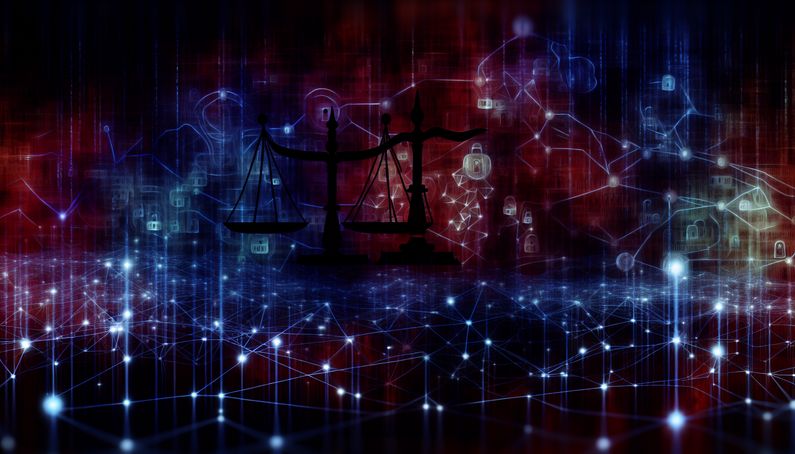
Navigating the Complexities of Cybercrime Prosecution: The REvil Case
The release of REvil ransomware members after serving time for carding charges highlights the intricate web of legal, technological, and geopolitical challenges in prosecuting cybercrime. The REvil group, notorious for its global ransomware attacks, operated across borders, complicating legal proceedings and necessitating international cooperation. The U.S. Department of Justice has underscored the importance of a unified global strategy to combat such transnational cyber threats. However, differences in legal definitions and standards across jurisdictions often hinder these efforts, as seen in the Russian court verdict where charges did not align with those in other countries. This case exemplifies the need for enhanced digital forensic capabilities and international collaboration to effectively gather evidence and prosecute cybercriminals.
Legal Frameworks and Jurisdictional Challenges
Cross-Border Cooperation
Prosecuting cybercrimes, especially those involving transnational entities like the REvil ransomware group, is fraught with jurisdictional challenges. Cybercrime often transcends national borders, necessitating international cooperation. The REvil case exemplifies these complexities, as the group operated globally, affecting victims in various countries. The need for mutual legal assistance treaties (MLATs) and international cooperation is paramount to effectively prosecute such crimes. However, differences in legal systems and priorities can hinder these efforts. For instance, while the United States actively pursued REvil members, other countries may have different legal frameworks or priorities that complicate extradition and prosecution efforts. The U.S. Department of Justice has emphasized the importance of a collaborative approach, highlighting the need for a unified global strategy to combat cybercrime.
Legal Definitions and Standards
One of the primary challenges in prosecuting cybercrime is the lack of uniform legal definitions and standards across jurisdictions. Cybercrime laws vary significantly from one country to another, leading to inconsistencies in how crimes are defined and prosecuted. For example, what constitutes a cybercrime in one country may not be recognized as such in another. This discrepancy can lead to challenges in gathering evidence, as well as in the extradition and prosecution of suspects. In the case of REvil, the group’s activities were classified under various legal categories, including hacking, money laundering, and illegal payment handling. However, the lack of standardized definitions complicates the legal process, as seen in the Russian court verdict where members were convicted on charges that may not align with those in other jurisdictions.
Evidence Collection and Digital Forensics
The collection of digital evidence presents another significant challenge in cybercrime prosecution. Cybercriminals often use sophisticated techniques to conceal their activities, making it difficult for law enforcement agencies to gather conclusive evidence. In the REvil case, investigators faced hurdles in linking suspects to specific criminal activities due to the group’s use of encryption and anonymization technologies. Digital forensics requires specialized skills and tools, and the rapid evolution of technology can outpace the capabilities of law enforcement agencies. Moreover, the legal procedures for evidence collection can vary between jurisdictions, further complicating cross-border investigations. The challenges faced by prosecutors in gathering evidence against REvil members underscore the need for enhanced digital forensic capabilities and international collaboration.
Political and Diplomatic Considerations
Geopolitical Tensions
Geopolitical tensions can significantly impact the prosecution of cybercrime, particularly when state actors or state-sponsored groups are involved. The REvil case is illustrative of this, as the group’s operations were linked to Russia, a country with which the United States and other Western nations have complex diplomatic relations. Political considerations can influence the willingness of countries to cooperate in cybercrime investigations and extraditions. For instance, the U.S. government’s efforts to hold REvil accountable were complicated by the broader geopolitical context, including tensions over issues such as cybersecurity and election interference.
Diplomatic Efforts and Sanctions
Diplomatic efforts and sanctions are tools that countries can use to pressure other nations into cooperating in cybercrime investigations. In the case of REvil, the U.S. government employed diplomatic channels to urge Russia to take action against the group. Additionally, sanctions were imposed on individuals and entities linked to REvil, aiming to disrupt their operations and financial networks. However, the effectiveness of these measures can be limited by the willingness of other countries to enforce them. The sanctions and diplomatic efforts related to REvil highlight the challenges and limitations of using these tools in the context of cybercrime prosecution.
Technological Advancements and Challenges
Encryption and Anonymization
Technological advancements, such as encryption and anonymization, pose significant challenges to cybercrime prosecution. Cybercriminals use these technologies to protect their identities and activities, making it difficult for law enforcement agencies to track and apprehend them. In the REvil case, the group’s use of encryption technologies hindered efforts to gather evidence and identify perpetrators. While encryption is a valuable tool for protecting privacy and data security, it also complicates law enforcement efforts to combat cybercrime. Balancing the need for privacy with the need for effective law enforcement is a complex issue that requires careful consideration and international cooperation.
Rapid Technological Evolution
The rapid pace of technological change presents ongoing challenges for law enforcement agencies tasked with combating cybercrime. Cybercriminals continually adapt their tactics to exploit new technologies and vulnerabilities, requiring law enforcement to stay ahead of the curve. In the case of REvil, the group’s ability to quickly adapt and evolve its operations made it a formidable adversary. Law enforcement agencies must invest in training and technology to keep pace with these developments. The challenges of rapid technological evolution underscore the need for ongoing investment in cybersecurity and digital forensics capabilities.
Legal and Ethical Implications
Privacy and Civil Liberties
The prosecution of cybercrime raises important legal and ethical questions related to privacy and civil liberties. Efforts to combat cybercrime often involve surveillance and data collection, which can infringe on individuals’ privacy rights. Balancing the need for security with the protection of civil liberties is a critical challenge for policymakers and law enforcement agencies. In the REvil case, the use of surveillance and data collection was necessary to gather evidence and identify suspects. However, these measures must be implemented with care to avoid overreach and protect individuals’ rights. The legal and ethical implications of cybercrime prosecution highlight the need for clear legal frameworks and oversight mechanisms.
Accountability and Justice
Ensuring accountability and justice in cybercrime cases is a complex task, particularly when dealing with transnational groups like REvil. The prosecution of cybercriminals requires a coordinated effort across jurisdictions, and achieving justice for victims can be challenging. In the case of REvil, the group’s global operations affected numerous victims, and holding its members accountable required cooperation between multiple countries. The pursuit of justice in cybercrime cases must be balanced with the need to respect legal processes and protect the rights of defendants. The challenges of ensuring accountability and justice in cybercrime cases underscore the importance of international cooperation and robust legal frameworks.
Conclusion
The prosecution of cybercrime, as illustrated by the REvil case, involves navigating a complex landscape of legal, technological, and geopolitical challenges. Addressing these challenges requires international cooperation, investment in technology and training, and a careful balance between security and civil liberties. As cybercrime continues to evolve, so too must the strategies and frameworks used to combat it, ensuring that justice is served and that victims receive the support they need.
Final Thoughts
The REvil case serves as a stark reminder of the complexities involved in prosecuting cybercrime. It underscores the necessity for international cooperation and robust legal frameworks to navigate the challenges posed by jurisdictional differences and rapid technological advancements. The challenges faced by prosecutors in gathering evidence highlight the need for improved digital forensic capabilities. Moreover, geopolitical tensions and diplomatic efforts, such as those employed by the U.S. government, play a crucial role in holding cybercriminals accountable. As cyber threats continue to evolve, so too must our strategies to ensure justice and support for victims.
References
- Cybersecurity Dive. (2024). U.S. Department of Justice emphasizes global strategy against REvil. https://www.cybersecuritydive.com/news/kaseya-ransomware-REvil-crackdown/609742/
- Security Affairs. (2024). Russian court verdict on REvil ransomware group member. https://securityaffairs.com/170287/cyber-crime/revil-ransomware-group-member-sentenced.html
- Cybersecure Fox. (2024). Challenges in prosecuting REvil cybercrime group. https://cybersecurefox.com/en/revil-cybercrime-group-russian-court-verdict-challenges/
- ZDNet. (2024). DOJ charges and sanctions REvil leaders. https://www.zdnet.com/article/doj-charges-and-sanctions-revil-leaders-behind-kaseya-attack-seizes-6-million-in-ransoms/



